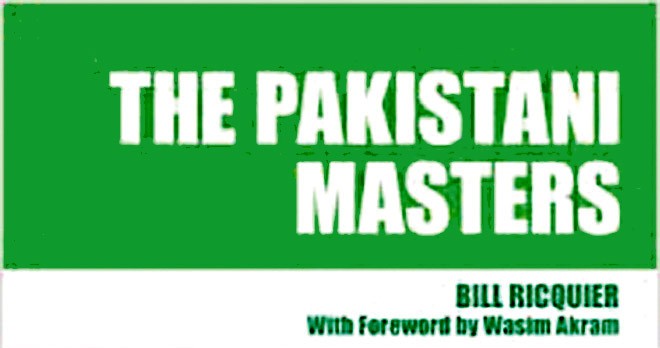
The Pakistani Masters takes you down the memory lane and leaves you roaming around from 1947 till 2010

Did you know that strict disciplinarian Abdul Hafeez Kardar was once sent off the field by his county captain for not trying hard enough? That teammates used to refer to Hanif Mohammad as Dilip due to his filmi looks (Dilip as in Dilip Kumar). And that Mushtaq Mohammad was the first cricketer who brought reverse sweep in public domain. Such information along with many others can be found in Bill Ricquier’s The Pakistani Masters.
The Pakistani Masters is not just a book about Pakistan cricket -- in fact it takes you down the memory lane and leaves you roaming around from 1947 (five years before Pakistan cricket team was granted Test status) till 2010 (the last edition was complete till then). You get to know all about the iconic Test cricketers who have represented Pakistan and although a couple of names shouldn’t be there anymore (disgraced Danish Kaneria for one), there are many who will surely make it to the book’s next edition (suggestions include Misbah ul Haq, Younis Khan and Saeed Ajmal).
This book educates and entertains the readers at the same time, something few publications may claim to do. It has some interesting stories to tell from the days of A H Kardar, Hanif Mohammad and Fazal Mehmood to the times of Imran Khan and Javed Miandad; followed by the era of Inzamam ul Haq, Wasim Akram and Waqar Younis.
On the whole, 26 of the best Pakistani cricketers are discussed in this book like never before -- even fans of Shoaib Akhtar and Shahid Afridi will have something to look forward to when they get their hands on this publication.
From this book, you get to learn a lot of things about Pakistan cricket such as:
* Abdul Hafeez Kardar was behind the reorganisation of domestic cricket in Pakistan
* Fazal Mehmood was known as the Pakistani (Alec) Bedser
* Pacers John Snow and Mike Procter were instrumental in Imran Khan’s remodeled bowling action
* Pakistan’s team in 1974 was the first side since Bradman’s 1948 team to remain undefeated in England
* Javed Miandad became a county cricketer before he became a Test cricketer
* Mushtaq Mohammad was as futuristic as one could be; in 1979, he wanted to play Tests only but was dropped from both ODIs and Tests
* On England’s tour of 1992, Mark Nicholas’ wasn’t given out when he should have been in a tour match; and that made Pakistanis very angry
The writer also pays rich tributes to his favourite Pakistani cricketers -- especially the fast bowlers. He compares Imran Khan to late French President Charles de Gaulle and later writes: "Sarfraz was Robert Mitchum to Imran Khan’s Cary Grant."
Of Imran Khan’s reemergence in Test cricket during the series against Australia, he boldly writes: "As one great fast bowler departed the scene, albeit temporarily (Jeff Thompson due to injury), so another arrived." Cool, isn’t it?
But not everything is perfect in this book; there are times when the writer bores you with details. How can Robert Louis Stevenson’s classic novel Treasure Island remind one of street-smart cricketer Javed Miandad and why is there a history lesson about spin bowling in the chapter supposed to discuss Abdul Qadir. Pakistan’s best left-arm spinner Iqbal Qasim deserved one chapter to himself but doesn’t get it; even one of the country’s greatest victories against India at Bangalore in 1987 get minimal mention. Some points to ponder before the next edition, I believe.
The Pakistani Masters may not be the definitive book on history of Pakistani cricket but it does give you an insight as to how cricket has fared in the country over the years. The statistical and biographical profile of the best players produced by Pakistan is just one way to pay tribute to the game. So if you didn’t know that Fazal Mehmood was picked for India’s tour of Australia but couldn’t represent them as Pakistan came into being or that Abdul Qadir was repeatedly at loggerheads with the management, don’t worry.
Just get your hands on this book and know all there is to know about your favourite Men in Green. For me, the way the writer described Wasim Akram’s bowling in final of World Cup 1992 was enough to become a fan. He wrote three words regarding that spell and that had me spellbound -- "it was magic".